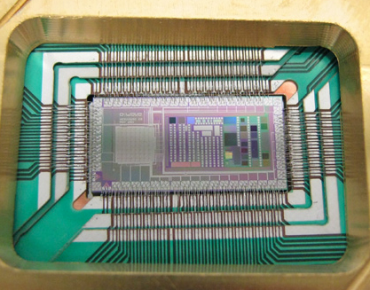Microsoft, Rambus Collaborate on Quantum Computing

Rambus Inc., the chip technology intellectual property vendor, is working with Microsoft Research on future memory requirements for quantum computing.
Rambus (NASDAQ: RMBS), Sunnyvale, Calif., confirmed just before the holidays it is collaborating with the software giant (NASDAQ: MSFT) on memory systems for next-generation quantum computing. The promising but largely untested technology is slowly gaining traction as current computing architectures run out of steam.
Rambus noted that memory requirements are being driven by soaring system demand as consumption of real-time data expands. That requirement "is driving the need to explore new high-performance, energy-efficient computer systems," Gary Bronner, vice president of Rambus Labs, noted in a company blog post. “By working with Microsoft on this project, we can leverage our vast expertise in memory systems to identify new architectural models.”
The research partners said they would pool their resources to explore future computing architectures capable of enhancing memory capabilities for a range of future use cases. They also will explore how memory technologies can be used to boost overall system performance as data volumes skyrocket and the list of data sources expands.
While startups like D-Wave Systems Inc. have focused on quantum computing hardware and components, Microsoft is targeting theoretical approaches for future quantum computing, including software design. "We are engaging with partners that have critical expertise, such as Rambus, to build new types of computing platforms," Douglas Carmean, architect for quantum architectures and computation at Microsoft Research, added in a statement.
Microsoft's quantum computing research is focused primarily on implementation and developing new applications based on the technology. The collaboration with Rambus on memory requirements builds on earlier work developing "real-world" quantum algorithms and designing software architectures for programming new algorithms on scalable quantum machines.
Application development at Microsoft Research targets technologies ranging from machine learning and scalable quantum computation to cryptography.
Rambus emerged as a semiconductor powerhouse in the 1990s based on its "RDRAM" technology designed to boost memory performance. The Rambus business model has been based on licensing its technology to other memory chipmakers while aggressively defending its patent portfolio. Last August, the company announced it would begin selling memory chips under its own brand.
Meanwhile, Vancouver-based D-Wave Systems has announced agreements over the last several months to provide quantum computer technology and hardware to Google (NASDAQ: GOOG) and NASA, which jointly operate a D-Wave 2X quantum annealer. Other D-Wave customers include Los Alamos National Laboratory and military contractor Lockheed Martin (NYSE: LMT). Installation of its 2X System at a Lockheed Martin facility was to be completed this month.
While Microsoft, Google, NASA and the Defense Advanced Research Projects Agency have invested heavily in quantum computing research, test results have so far been disappointing. For example, benchmark testing of the D-Wave Two system in 2014 found it to be no faster than traditional supercomputers for some computations. Proponents of the technology disputed the benchmark results.
Related
George Leopold has written about science and technology for more than 30 years, focusing on electronics and aerospace technology. He previously served as executive editor of Electronic Engineering Times. Leopold is the author of "Calculated Risk: The Supersonic Life and Times of Gus Grissom" (Purdue University Press, 2016).











